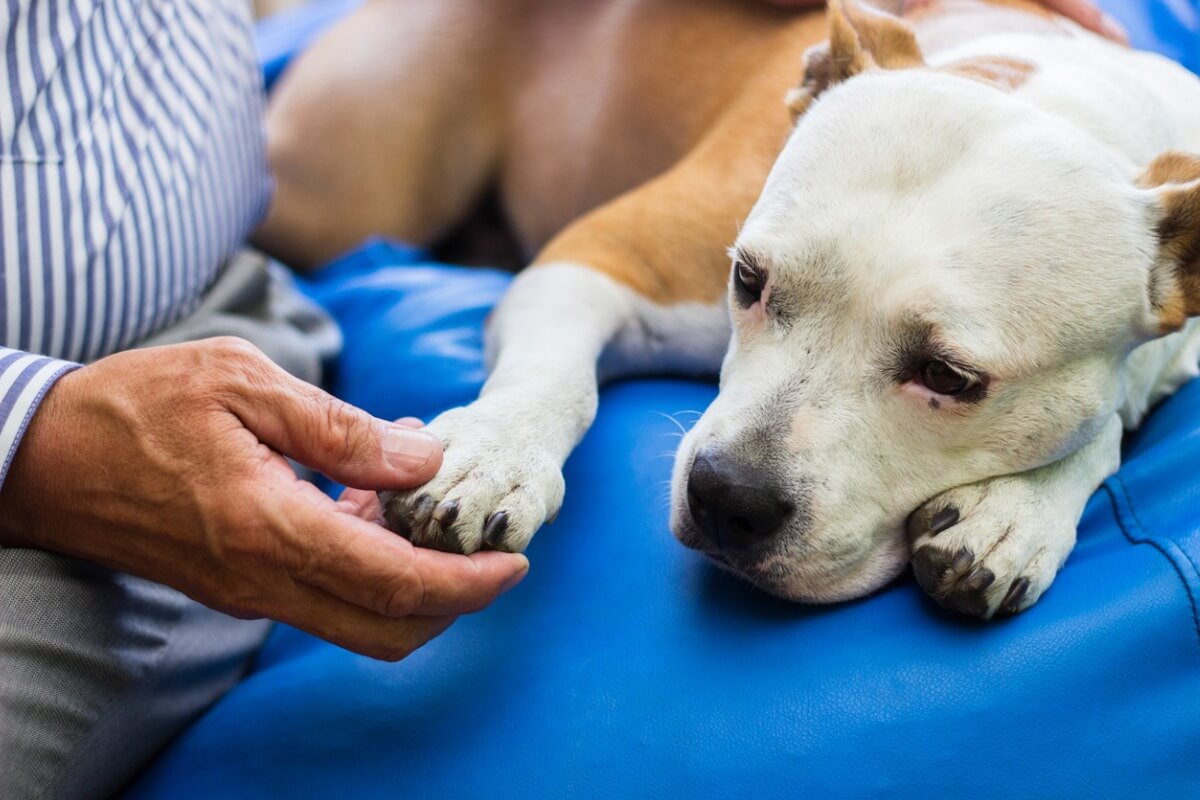15 Reasons to Adopt an Elderly Dog

If you’re thinking of expanding your family with a new member, you may well be tempted to look for a puppy; these adorable animals love to play and they bring life to the house. However, here we’re going to try to convince you to adopt an elderly dog, because having one of them can also be the best experience of your life.
Elderly dogs that enter a shelter rarely leave, and even more so if they’re large. That’s why taking in an elderly dog will mean giving them just what they deserve: a dignified old age. If you still need more reasons, don’t miss out on the following!
15 reasons why you should adopt an elderly dog
Imagine that, as an elderly person, you’re abandoned. Then someone picks you up and takes you to a place where there’s shelter and food, but nothing else that you need. Your bones ache, the other residents yell all the time, and it’s always either too hot or too cold. Do you need more reasons to adopt an elderly dog? Here they are!
1. Their low activity level
If you want to help a dog have a good life and you prefer the routine of the couch and a blanket, then an elderly dog is the best option. Almost all of them are quiet animals, who enjoy a slow walk and use their toys while lying on the floor. Their companionship is quiet and full of naps.
2. Their personality is defined
When adopting a puppy you don’t know if the personality they’ll develop will be compatible with your lifestyle. An older dog, on the other hand, already has a developed character and the shelter staff will find one that fits with you much more easily.

3. They already know how to behave
Whether for better or worse, this dog has gone through a training process. They know how to respect your space and they choose a place to rest that they’ll return to by themselves. In general, an elderly dog is clear about how to get along in a home and coexistence will be quite easy, with just a few adjustments to make.
4. They learn their limits easily
Bear in mind that these dogs have a life behind them in which they have learned to deal with humans! Most of the commands you give them will be familiar to the animal, so you won’t need to scold them. In a short time, they’ll know exactly what and what not to do.
5. Great adaptability
Part of the experience mentioned above gives them another advantage: they’re animals that adapt to many types of environments. They’re ideal for homes with children (as long as the kids respect them, of course), older adults, people with functional diversity, to name just some.
6. Routine
Another reason to adopt an elderly dog is that they like routine. If during their puppy and adult stage it was beneficial to follow an orderly day-to-day routine, then how much more as an elderly dog. This gives them peace of mind and time to enjoy peaceful times with you.
7. They don’t need long walks
Most elderly dogs are already suffering from the ailments of age, so they won’t be able to spend hours running and playing outside. Although they obviously have to go out several times a day, the walks will be quiet and calm.
8. They’re grateful
To say that a dog is grateful may sound anthropomorphic, but the truth is that there’s no other word to define what a dog can do when they find a home that cares for them and loves them. Watching them rejuvenate and bond with you, even watching them sleep peacefully, will be the best gift of all.
9. They’re loving
As old age comes, hearts soften and need more affection, whether you’re a dog or a human. Older dogs tend to be more affectionate and, even if they’re a type that doesn’t give many signs of affection, you’re sure to see them enjoying much more of the affection you give them.
10. It’s independent
One of the most convincing reasons to adopt an elderly dog is its great independence. These canines don’t usually need you to guide them through the daily routine, as they learn it quickly and follow it without problems.
11. They’re a great companion for older adults
Many older people can’t give a puppy all the activity they need and training can be costly. That’s why an elderly dog is a good choice, because they already have basic training and their pace of life is very similar to that of the human elderly.
12. They don’t destroy things
The time of teething and destroying toys (and non-toys) is long gone for elderly dogs. Also, any destructive tendencies from a bad upbringing in the past will be easy to correct.
13. You’ll help the shelter
Shelters go out of their way to help their animals, overcoming many obstacles and with little help. There’s no greater joy than to see a dog that has suffered finding a good family. And, in addition to this, they’ll be able to take another dog in to replace your new companion.
14. You will avoid them being put down
Unfortunately, some places are forced to put down dogs that don’t get a home. Although shelters will always work to avoid this at all costs, elderly and sick dogs will always be first on the list.
15. A dignified and happy end to their lives
Finally, we believe that this is the most important reason to adopt an elderly dog: to ensure that they have a have end to their lives. No dog deserves to die uncared for, or abandoned in a rescue center, despite the wonderful work these centers do.

There’s also something special about an elderly dog’s eyes. You may not be able to see it with the naked eye at first, but once you bond with them, you’ll be aware of everything they’re trying to tell you with their eyes. Don’t worry about the fact that they’ll spend fewer years with you than a puppy, because the years they’ll be with you will be lived to the full!
If you’re thinking of expanding your family with a new member, you may well be tempted to look for a puppy; these adorable animals love to play and they bring life to the house. However, here we’re going to try to convince you to adopt an elderly dog, because having one of them can also be the best experience of your life.
Elderly dogs that enter a shelter rarely leave, and even more so if they’re large. That’s why taking in an elderly dog will mean giving them just what they deserve: a dignified old age. If you still need more reasons, don’t miss out on the following!
15 reasons why you should adopt an elderly dog
Imagine that, as an elderly person, you’re abandoned. Then someone picks you up and takes you to a place where there’s shelter and food, but nothing else that you need. Your bones ache, the other residents yell all the time, and it’s always either too hot or too cold. Do you need more reasons to adopt an elderly dog? Here they are!
1. Their low activity level
If you want to help a dog have a good life and you prefer the routine of the couch and a blanket, then an elderly dog is the best option. Almost all of them are quiet animals, who enjoy a slow walk and use their toys while lying on the floor. Their companionship is quiet and full of naps.
2. Their personality is defined
When adopting a puppy you don’t know if the personality they’ll develop will be compatible with your lifestyle. An older dog, on the other hand, already has a developed character and the shelter staff will find one that fits with you much more easily.

3. They already know how to behave
Whether for better or worse, this dog has gone through a training process. They know how to respect your space and they choose a place to rest that they’ll return to by themselves. In general, an elderly dog is clear about how to get along in a home and coexistence will be quite easy, with just a few adjustments to make.
4. They learn their limits easily
Bear in mind that these dogs have a life behind them in which they have learned to deal with humans! Most of the commands you give them will be familiar to the animal, so you won’t need to scold them. In a short time, they’ll know exactly what and what not to do.
5. Great adaptability
Part of the experience mentioned above gives them another advantage: they’re animals that adapt to many types of environments. They’re ideal for homes with children (as long as the kids respect them, of course), older adults, people with functional diversity, to name just some.
6. Routine
Another reason to adopt an elderly dog is that they like routine. If during their puppy and adult stage it was beneficial to follow an orderly day-to-day routine, then how much more as an elderly dog. This gives them peace of mind and time to enjoy peaceful times with you.
7. They don’t need long walks
Most elderly dogs are already suffering from the ailments of age, so they won’t be able to spend hours running and playing outside. Although they obviously have to go out several times a day, the walks will be quiet and calm.
8. They’re grateful
To say that a dog is grateful may sound anthropomorphic, but the truth is that there’s no other word to define what a dog can do when they find a home that cares for them and loves them. Watching them rejuvenate and bond with you, even watching them sleep peacefully, will be the best gift of all.
9. They’re loving
As old age comes, hearts soften and need more affection, whether you’re a dog or a human. Older dogs tend to be more affectionate and, even if they’re a type that doesn’t give many signs of affection, you’re sure to see them enjoying much more of the affection you give them.
10. It’s independent
One of the most convincing reasons to adopt an elderly dog is its great independence. These canines don’t usually need you to guide them through the daily routine, as they learn it quickly and follow it without problems.
11. They’re a great companion for older adults
Many older people can’t give a puppy all the activity they need and training can be costly. That’s why an elderly dog is a good choice, because they already have basic training and their pace of life is very similar to that of the human elderly.
12. They don’t destroy things
The time of teething and destroying toys (and non-toys) is long gone for elderly dogs. Also, any destructive tendencies from a bad upbringing in the past will be easy to correct.
13. You’ll help the shelter
Shelters go out of their way to help their animals, overcoming many obstacles and with little help. There’s no greater joy than to see a dog that has suffered finding a good family. And, in addition to this, they’ll be able to take another dog in to replace your new companion.
14. You will avoid them being put down
Unfortunately, some places are forced to put down dogs that don’t get a home. Although shelters will always work to avoid this at all costs, elderly and sick dogs will always be first on the list.
15. A dignified and happy end to their lives
Finally, we believe that this is the most important reason to adopt an elderly dog: to ensure that they have a have end to their lives. No dog deserves to die uncared for, or abandoned in a rescue center, despite the wonderful work these centers do.

There’s also something special about an elderly dog’s eyes. You may not be able to see it with the naked eye at first, but once you bond with them, you’ll be aware of everything they’re trying to tell you with their eyes. Don’t worry about the fact that they’ll spend fewer years with you than a puppy, because the years they’ll be with you will be lived to the full!
All cited sources were thoroughly reviewed by our team to ensure their quality, reliability, currency, and validity. The bibliography of this article was considered reliable and of academic or scientific accuracy.
- Sánchez, C. T., Castro, F. V., Herrera, S. S., & Acuñas, M. G. (2013). Estado del arte sobre los efectos de la terapia asistida con perros en el tratamiento de enfermos de Alzheimer. International Journal of Developmental and Educational Psychology, 1(2), 271-281.
- Comunidad de Madrid. (2021, abril). Ley 4/2016, de 22 de julio, de Protección de los Animales de Compañía de la Comunidad de Madrid. https://www.boe.es/buscar/pdf/2016/BOE-A-2016-11097-consolidado.pdf
- Sociedad, A. C. Y. (2021, 27 julio). Tercera edad y animales, ¿el binomio perfecto? Universidad Rey Juan Carlos – Cátedra animales y sociedad. Recuperado 15 de diciembre de 2021, de https://catedraanimalesysociedad.org/terceraedadyanimales/
This text is provided for informational purposes only and does not replace consultation with a professional. If in doubt, consult your specialist.








